Publication

İstanbul’u Doyurmak: Gıda İaşesinin Politik Ekonomisi
İstanbul, yüzlerce yıl Osmanlı İmparatorluğu’na başkentlik yapmış, günümüzdeyse Türkiye’nin finansal kalbi olan, tarihî, kültürel ve ekonomik açıdan her zaman önemli bir şehir. İstanbul’u Doyurmak, “iaşe”nin, iktidarın kendini var etme araçlarından biri olduğu tespitinden hareket ederek söz konusu tespitin yüzyıllar içinde bu toprakların kendine has ekonomi politiğiyle nasıl dönüşüp ne gibi sosyal ve siyasi sonuçlar yarattığını ele alıyor.
Osmanlı döneminde İstanbul’un iaşesine ilişkin birincil kaynakları, tarihî, antropolojik ve coğrafi çalışmaları kullanarak gıda sisteminin özelliklerini belirleyen Türkkan, bu sistemin 19. yüzyıldaki çözülüşünü takip ederek Osmanlı’dan Cumhuriyet’e uzanan geniş bir tarihsel süreçte gıda rejiminin son derece etraflı bir analizini yapıyor.
1980’lerden itibaren gündelik hayatta/ ekonomide yaşanan dönüşüm ve değişimlerin, neoliberal politikaların, küreselleşmenin, sermaye piyasalarının, tedarik zincirlerinin izini sürerek İstanbul’un nasıl doyurulduğunun/doyduğunun günümüzdeki dinamiklerine daha yakından bakıyor.
Üstelik hem farklı bir gıda sistemi hem de farklı bir gıda rejimi vaat eden “karşı hareketleri”, alternatif yaklaşımları da ihmal etmeyerek. İstanbul’un olduğu kadar Türkiye’nin de gerek tarihini gerek iaşe kültürünü, değişen beslenme politikalarını anlamak için çok önemli bir kaynak.
Publication
>>> I did a short talk with Istanbul Policy Center on political ecology of food and political economy. We edited the talk a bit, shortened it, and here it is – published as a chapter (“Beslenmenin Sürdürülebilirliği ve Soframızın Ekonomi-Politiği“) in Gıdanın Politik Ekolojisi edited by Fikret Adaman and Sena Akkoç.

Publication
>>> Third and the last piece of my series on food banks in Istanbul is out from Journal of Cultural Economy. Unlike the other two pieces, in this one, I am focusing on the invisible yet powerful databases and the social and the technological infrastructures that make them possible.
Title: Screening for eligibility: access and resistance in Istanbul’s food banks
Abstract: Introduced in the 2000s as a component of social welfare reforms, the means test determines the eligibility of aid applicants based on previously set income categories. Replacing local committees that decided eligibility, this centralized and digitalized screening process rests on information infrastructures that are mostly invisible. This paper argues that the ways in which applicants contest the outcome of the means test, subvert the eligibility requirements, and go around the screening processes, make visible these otherwise-mostly invisible information infrastructures. Through a discussion of the contestations, subversions, and go-arounds applicants use (not always successfully) to receive emergency food relief from municipal food banks in Istanbul, the paper shows that these information infrastructures not only appear as if they are value-neutral and apolitical, but in so doing, they also serve as useful tools for obscuring who the actual decision makers are.
Interview
>>> I did an interview with folks at Aposto/Apero! We discussed a whole bunch on food sovereignty, food culture and sustainability – and how the Maras Earthquake will impact all these.
Link here! Enjoy!

Talk
I am giving a talk at the Galatasaray University Toplumsal Araştırmalar Merkezi.
They have an awesome series of talks, titled “Kır ve Kent İlişkisine Yeniden Bakmak: Tarımsal Gıda Alanındaki Sosyo-Ekonomik Dinamikler”. I will be talking about the most recent food crisis, and whether the neo-peasant model can actually offer a sustainable solution to what we are going through.
Excited!
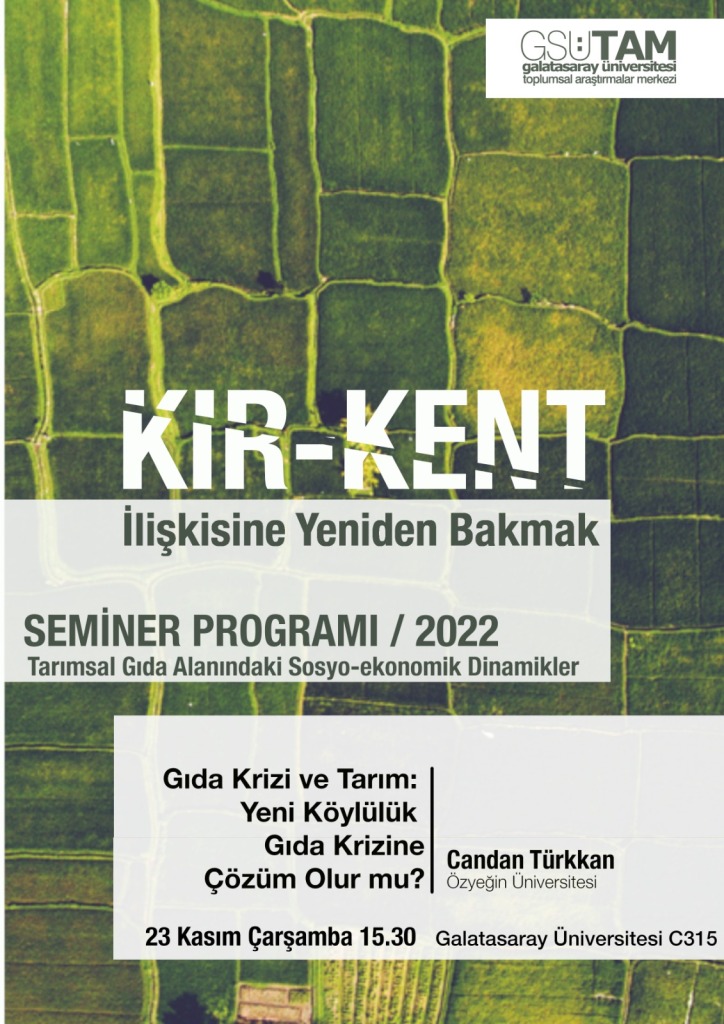
Workshop
I presented my research on the neo-peasants at the second session of the Agrarian Live seminars.
Overall a great discussion on the increasing heterogeneity of agrarian structures in Turkey. Loads of instructive feedback!
Looking forward to the next session!

To watch the video of the discussion:
Workshop
>>> Agrarian Live seminars have begun!
First session was held on June 1st (after a week of delay), 2022 where Dr. Atakan Buke and Prof. Zulkuf Aydin discussed some quite difficult questions on Marxist conceptualizations of peasantry. And, I was moderating!
Next session, I will be on the hot seat. Looking forward to the discussion at the end of June!
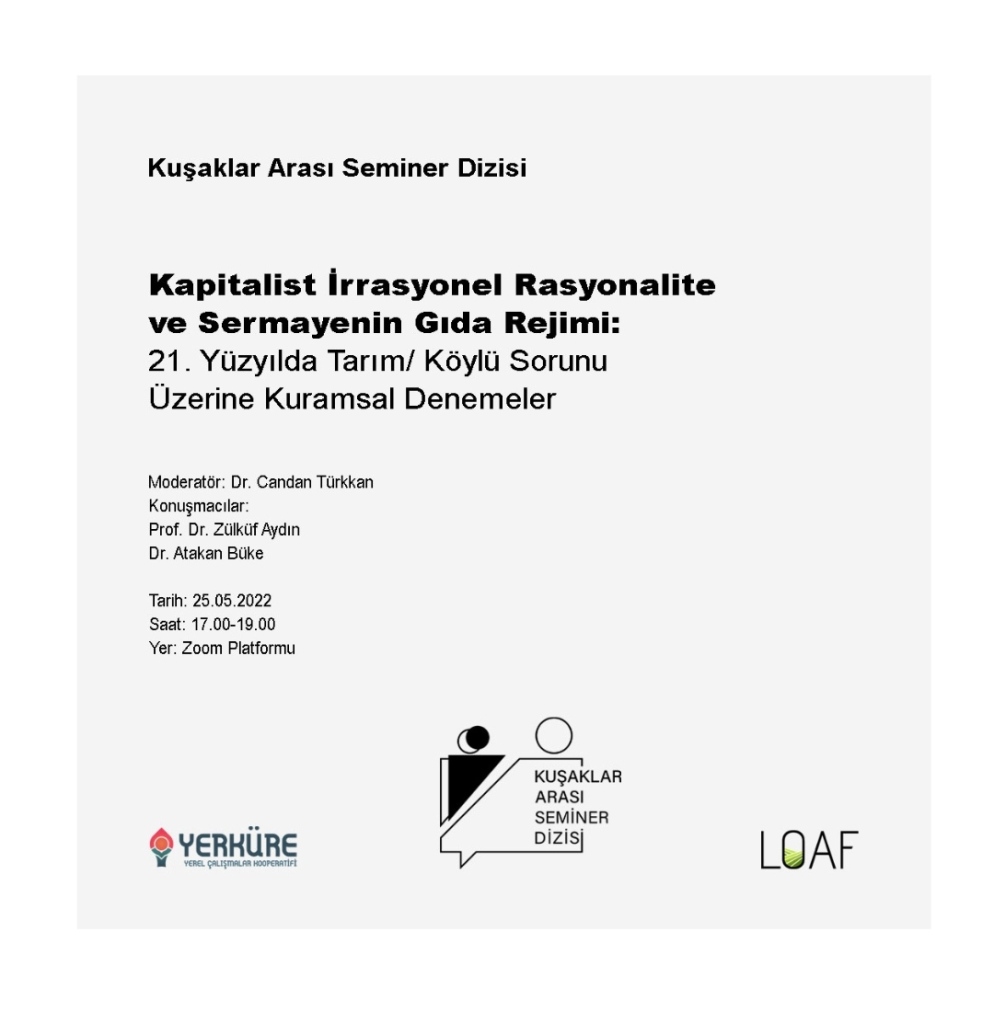
Workshop
>>>Gastronomi’de Ne Pişiyor? is Ozyegin University Department of Gastronomy’s new monthly seminar series on the faculty’s new, cutting-edge research.
I kicked off the series with a talk on my ongoing research on neo-peasantry. Some very very lively online and face to face discussion!

Publication
>>> When my fieldwork on bazaars and farmers markets in Istanbul began to yield conceptual discrepancies against what the literature had to offer, I decided to write about it. Different Forms of Embeddedness at Istanbul’s Bazaars and Farmers’ Markets offers an analysis of those discrepancies and suggest few entryways into how we might start thinking about similarly ‘ill-fitting’ (wink wink!) cases from the Global South.
To read, follow the link.
Title: Different Forms of Embeddedness at Istanbul’s Bazaars and Farmers’ Markets
Abstract: This paper assesses what social, ecological, and spatial embeddedness of food entails in different food exchange sites in Istanbul. The paper argues that discussions around embeddedness have focused primarily on cases from the Global North and have ignored sites from the Global South where different food actors (wholesalers, vendors, farmers, farmer-vendors) and production practices (local vs. alternative (certified organic vs. PGS vs. not-certified organic or ‘natural’) vs. conventional) can and do coexist in the same food exchange site. Then, using participant observation and interview data from
Istanbul’s bazaars (periodic markets) and farmers markets associated with the locavore movement (FMs), the paper shows that food is re-socialized and re-spatialized in both sites; however, what that socialization and spatialization entails (in each site) is constitutively different: The FMs aim to generate a community of eco-conscious food citizens even as there may be significant socio-economic differences between consumers and producers who participate at the FMs; whereas bazaars emphasize the maintenance of neighborhood communities. Yet, who constitutes those communities is neighborhood- and bazaar- specific. At the city’s outskirts, such communities may include vendors, farmer-vendors, and consumers; whereas at bazaars more centrally located, the neighborhood community generated and maintained outside the bazaars tends to be reproduced at the bazaars, thus
usually excluding the vendors. In short, not only are there differences between these two different types of sites in terms of the social, spatial, and ecological embeddedness of food, but there may also be differences within the types depending on where each site is located. The paper concludes by discussing the implications of these differences for the food movement in Turkey in general, and for the locavore movement in particular.
Interview
>>> I did an interview on my fieldwork on bazaars and farmers markets in Istanbul, following my presentation on Food Matters and Materialities Conference (Online, 2021).
Embedding Food Through Local Movements
By: Jennifer Whitaker
Dr. Candan Türkkan is a professor of politics and sustainability in Ozyegin University’s Gastronomy and Culinary Arts department in Istanbul, Turkey. At the 2021 Food Matters and Materialities conference, Dr. Türkkan gave a presentation about local food movements in Istanbul, which, she argues, contribute to the “embeddedness” of food. She explained that “embeddedness” is important because it reconnects food to the production process. Still, it also allows people to be more connected to their food, the people, and the practices it was produced by”.
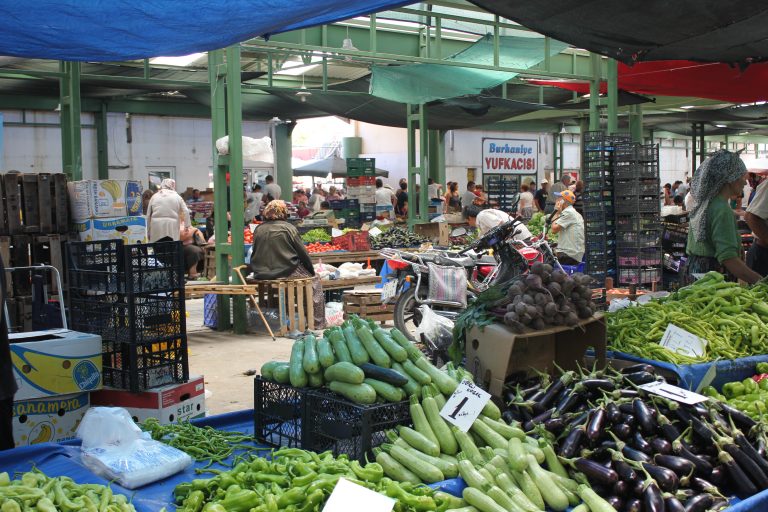
Bazaar in Burhaniye, Turkey. Credits: Courtesy of Candan Turkkan.
Throughout her research, Dr. Türkkan has learned that the locals involved in the agri-food system in Istanbul feel they had lost a sense of belonging and urban identity because of the transformations in the food system and how people source their food. For example, she observed how significant urban transformation and technological advancement impacted consumers’ access to purchase food. From ordering groceries online to major superstores and grocers, people are increasingly disconnected from the people and places that produced their food and each other. Dr. Türkkan explains that it matters as, “When food is disembedded, people are less likely to care as much, people only care if their food is cheap and edible”.
Türkkan’s presentation at the Conference helped the audience to appreciate the value of embeddedness in local practices and food movements. She focussed specifically on comparing farmers’ markets (popular in the Global North) and bazaars (large marketplaces popular in the Middle East). The two types of markets differ in terms of producers, vendors, and consumers. Dr. Türkkan explained that typically, bazaars in metropolitan city centres occur weekly and are operated by vendors selling produce from wholesalers. As a result, they attract local neighbourhood residents. However, farmers’ markets consist of vendors who are also the producers and attract a variety of customers.
While today’s global food system is fraught with concerns about working conditions and sustainability, local food movements – like farmers’ markets and bazaars – are a positive alternative to this disembedded system. In addition, as Türkkan highlights, if food is embedded, consumers would be a lot more aware of the production process of their food and likely be more concerned with issues in the process that may occur.
Türkkan also emphasized the significance of the “community-generating aspect of bazaars,” explaining how marketplaces provide opportunities for neighbours to connect each week – something that ordering groceries online does not allow for. This is especially relevant to recent circumstances during the Covid-19 pandemic. Local food movements like farmers’ markets or bazaars “re-socialize and re-spatialize” food, Türkkan explained. People who were alienated from one another or the environment can reconnect in these community-generating spaces.
Reflecting on this unique and isolating time, Türkkan’s emphasis on embeddedness can also help us think about the ‘power relations of locality’ and the challenges they pose to communities. By this, Türkkan means we still need to pay attention to how local food movements can also play a role in reproducing existing inequality, whether it is based on socio-economic status or gender. Türkkan’s presentation is helpful for thinking about how food is much more than what we eat – it is tied to every aspect of life and can be a site for meaningful change. Inequality has been exacerbated by the pandemic, so as we recover from the aftermath, we have a unique opportunity to make positive changes in our disembedded food system and reflect on the inequality that persists today.
Publication
>>> A long awaited publication on alternative food networks in Istanbul. I was collecting data on the current agro-food system, and of course, I went to talk to the members of few AFNs operating in Istanbul. Yet, the more I interviewed people, the more confused I became as to exactly what ‘constituted’ alternative – or what about AFNs that made them alternative. This paper answers these questions in the context of Istanbul.
To read, follow the link.
Title: What is the ‘Alternative’? Insights from Istanbul’s food networks
Abstract: Outside of the Global North, where agri-food systems have not yet consolidated into a ‘funnel shape,’ what makes an urban provisioning actor ‘alternative’ is not always clear. In this paper, I use members’ own definitions, emphases, and arguments to differentiate ‘alternative’ networks from other provisioning actors. Using data from semi-structured interviews, I show that while community-building and an affiliation with the food movement (broadly defined) are the most critical features identified by people who participate in these networks, more informal, ad hoc, familial or village networks that are utilized as a response to urban food insecurity are excluded. While such exclusions may not be unique, in this case, they reflect more fundamental divisions regarding what ‘alternative’ implies and how to challenge the throttling hold of conventional provisioning agents on the contemporary agri-food system.
Podcast
I was the guest for Ozan Zeybek & Hilal Alkan’s Havadan Sudan podcast. We talked about a whole bunch of things – food, politics, gastronomy, Istanbul, neoliberalism. Find the episode below. Happy listening!
Talk
I will be speaking on Feeding Istanbul for the Food Group of Birkbeck Institute for Social Research.
Registration is open for those who want to listen, and I think a recording will be made available later on as well.
Here is a link to the event page
Looking forward to seeing you all there!!
When: 29 June 2021, 18:00 — 19:30
Venue: Online
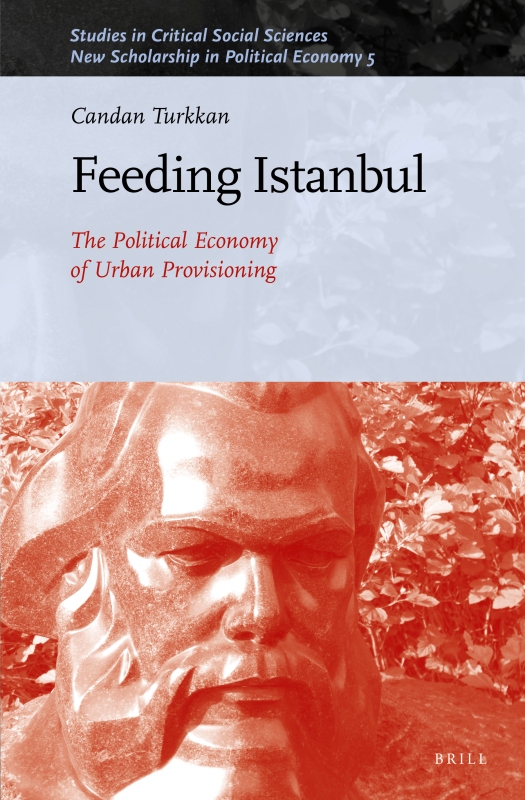
Talk

Book
Feeding Istanbul: The Political Economy of Urban Provisioning

Tracing how the sovereign’s duty to provision the city and protect his subjects from hunger was gradually transferred to the market and became a responsibility of the subjects (later, citizens) alone, Feeding Istanbul makes a compelling case for situating food politics, and politics of urban provisioning in particular, at the centre of the way we think about the relationship between the sovereign and the political community.
Talk
For those of you who might be interested, I will be discussing biopolitics, neoliberalism and right to subsistence/right to food.
Talk
For those of you who want to watch, here is my talk with SGDD – ASAM on Migration and Food:
Publication
>>> Second of a three-piece series on food banks in Istanbul/Turkey just came out in Food, Culture & Society. In this one, I discuss how the aid-recipients are constantly categorized and re-categorized, measured against a sense of ‘appropriateness’ that the food bank staff seems to perpetuate with regards to who should receive aid (and who shouldn’t). It is dark and depressing stuff – particularly since it lays out clearly various surveillance, control and categorization mechanisms and tools applicants and aid-recipients have to deal with daily.
To read, follow the link
Title: Who is “deserving” of aid? Subject-formation in Istanbul’s food banks
Abstract: This paper focuses on how the food banks, in working to allocate resources appropriately, constantly generate appropriate subjects, the “deserving poor”, and through processes of identification and verification, unmask the “undeserving poor”. The paper argues that process of identification, which includes practices of identification, registration, and documentation, push the applicants to self-identify and self-register as “the poor”. Next, process of verification, which includes practices of categorization, surveillance, and verification, divide the applicants into “deserving” and “undeserving”. While the “deserving poor” become the recipients of food aid from the food banks, the “undeserving” are characterized as lazy, greedy, and cunning and attempting to claim more than what they are entitled to. Even though the recipients resist this categorization, the separation is maintained to ensure that the aid is allocated appropriately. What is appropriate, however, is closely related to who is appropriate, which, in turn, is dependent upon who the food bank staff prioritize in terms of age, ethnicity, gender, employment, and marriage status. As such, not only some experiences of poverty and food insecurity are recognized as public problems, but also associations of reproductive and productive labor, public and domestic realm with specific gender roles and identities are reinforced.
Talk
Talk
I am going to be talking to Asli Aksoy of Eli Belinde Tarim about her experiences as a woman entrepreneur in agriculture. Looking forward to the conversation! – particularly to hearing about her journey to the top as Turkey’s premium asparagus grower! Come join us for this amazing talk today (March 9th, 2021) at 3.40 PM on Zoom!!
Interview
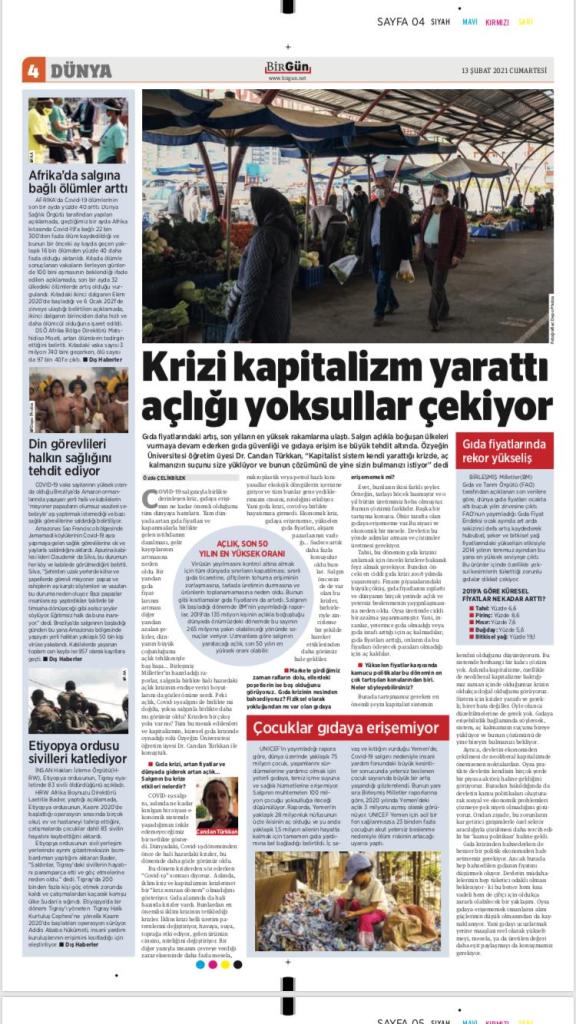
Birgün
I did an interview with the Turkish daily Birgün on the effects of the pandemic on the food supply chains and urban provisioning. A bit depressing, but well worth the read.
TL, DR: Poverty has consequences – and food insecurity, malnutrition and hunger are among the most important. While this in itself is not news, how the economic downturn fueled by the pandemic has made all of this so much more entrenched for so many more is.
Published on 02/13/2021
Interview
>>> I talked to Eylul Senses and Can Kocak from vesaire.org on the future of our food system. We discussed whether alternative food networks can be a feasible, food system-wide solution for us all and even if not, what they can teach us (TLDR: the value of organizing, engaging and participating as citizens in politics a la food; in other words, the value of democracy!!!) . It was a slightly depressing conversation, but ended on a positive note. Read the whole interview here: https://vesaire.org/candan-turkkan-kapitalizm-salgin-gida-tedarik-zincileri/
Publication
>>> First paper of what I hope to be a three-piece series on food banks in Istanbul/Turkey just came out of New Perspectives on Turkey (vol 62, pp.51-73). I discuss the food bank staff’s varying perceptions of who donates to the food banks. I then point out that the staff not only mis-perceives or mis-understands who the donors are, but that such a mis-perception is an intended masking of mis-managed (food) waste on the one hand and overproduction in the food supply chain on the other.
To read, follow the link
Title: Wasteful or sensible? Donor imageries in İstanbul’s food banks
Abstract: This paper explores how the staff of İstanbul’s food banks perceive the donors and the donations. The paper begins by exploring the literature on food banks; what food banks recover and redistribute; and the role food banks play in managing food insecurity. Next, how these three issues are represented in different models of food banks are discussed: in the non-profit model, the donors are “socially aware citizens” who contribute to the common good by helping to feed the hungry; whereas, for the for-profit model they are “caring capitalists” doing their best to reduce their carbon footprint and eliminate food waste while effectively managing the costs of waste disposal. In the municipal social markets, in contrast, the donors are “prodigal consumers” who cannot make correct resource allocation decisions and waste food as a result. For all the models, the donors are predominantly individuals or households and waste generation is perceived as a consumer problem, whereas in practice the donors are mostly corporations giving away their surplus stock. The paper concludes by underlining that this misperception shifts the conversation on waste generation and management away from production and supply chain problems and disciplines individuals as consumers.
Citation: Türkkan, C. (2020). Wasteful or sensible? Donor imageries in İstanbul’s food banks. New Perspectives on Turkey, 62, 51-73. doi: 10.1017/npt.2020.8
Publication
>>> Super excited for this new edited volume!!! Finally a stellar collection of STS works in Turkish. And, the best part? It is put together by the STS Turkey community!!
Of course, I have a contribution! Want to know more about what food banks have to do with databases and all? Well here is your chance!
Publication
>>> A new edited volume I have been looking forward to just came out of Nika Publications. I have contributed to the volume with a chapter discussing precarity and urban food insecurity in contemporary Istanbul.
If you want to order the book, click here for the info!
Publication
>>>I wrote a short piece on Covid 19 and its potential effects on the global social food movements. It is on Gastronometro. To read, click here

Publication
>>>I wrote a short piece on the effects of COVID 19 for the urban food supply chain. Read here.

Publication
>>>I have been wondering about how small businesses will handle the upcoming COVID19–adjacent food crisis. I finally put some of my thoughts on, well, virtual paper (i suppose?). If you want a quick read, click here
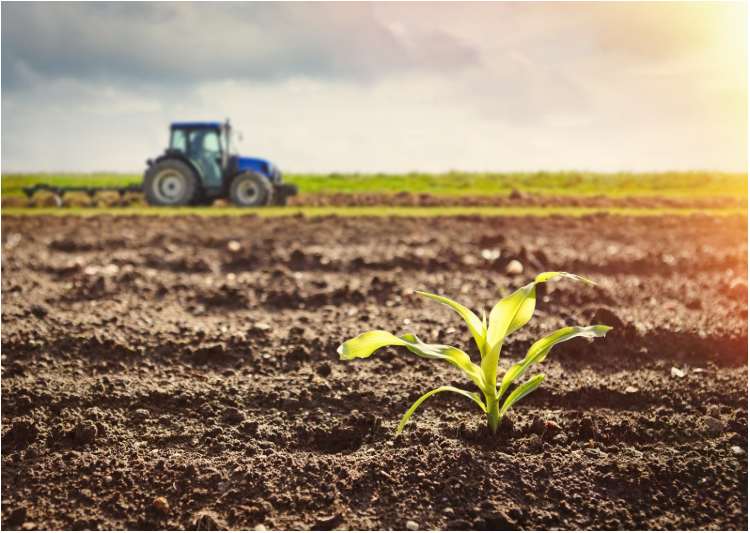
Talk
>>>I will be moderating a webinar with Associate Professor Özge Samancı and Chef Musa Dağdeviren. To see details click here!
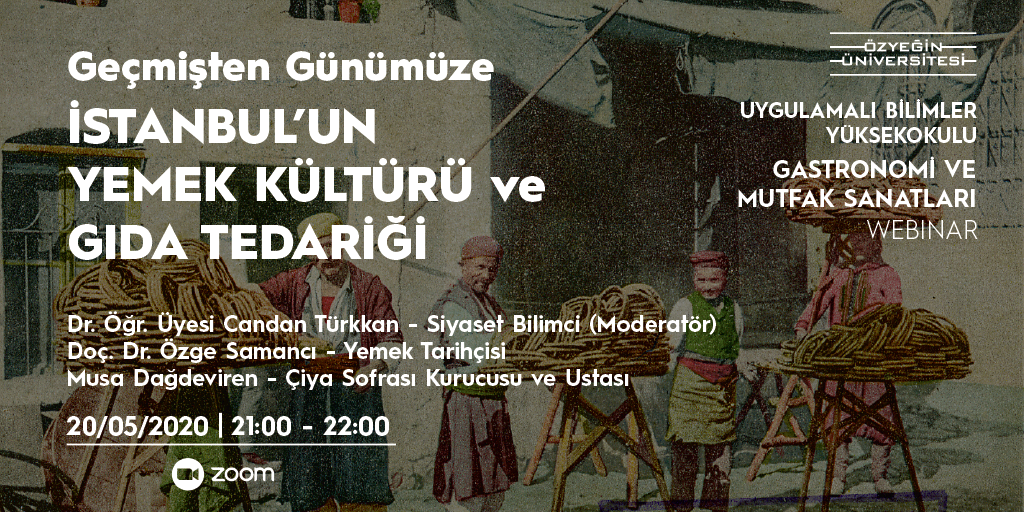
Publication
>>> I published a short piece in Metro Gastro volume 97. You can check it by clicking here

Talk
>>>I will be moderating a webinar with Prof. Mustafa Koç from Ryerson University. To see details click here!
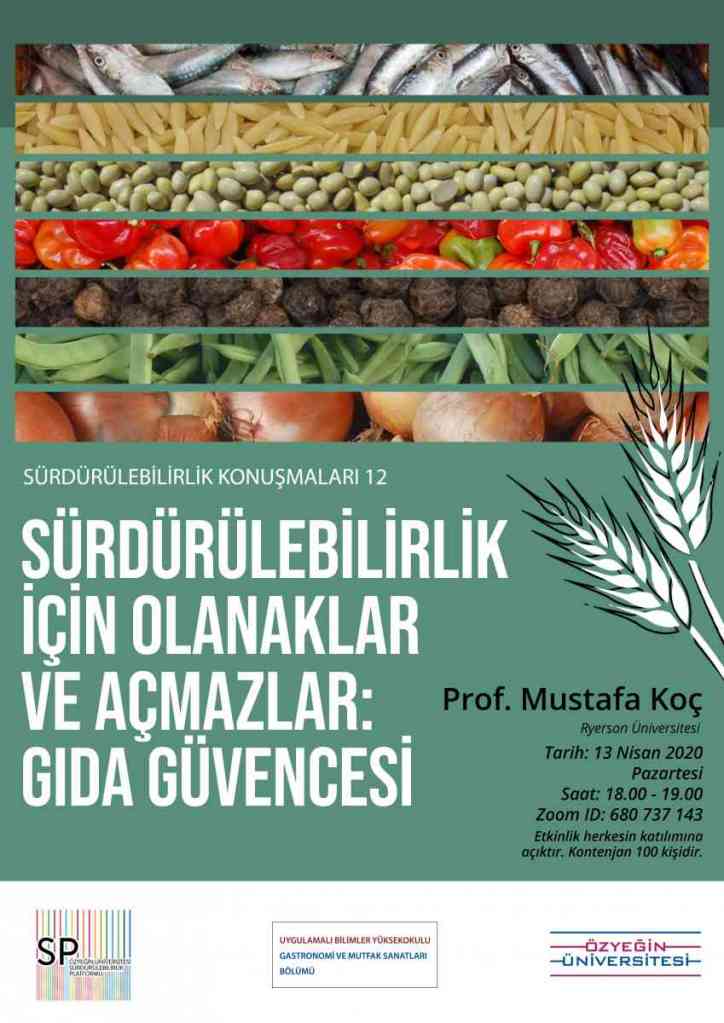
Talk
>>>I will be talking about the “Politics of Life and Death at Istanbul’s Food Banks” in Orient-Institut Istanbul. To see more details:

Talk
>>>I will be talking about resistance mechanisms lower income Istanbulites use against demographic data collection and decision-making vis-a-vis granting/denying access to food banks by state agencies at Tekpol Pizza Seminars ODTÜ. To see full program:
Odtü Tekpol Pizza Seminerleri 2019
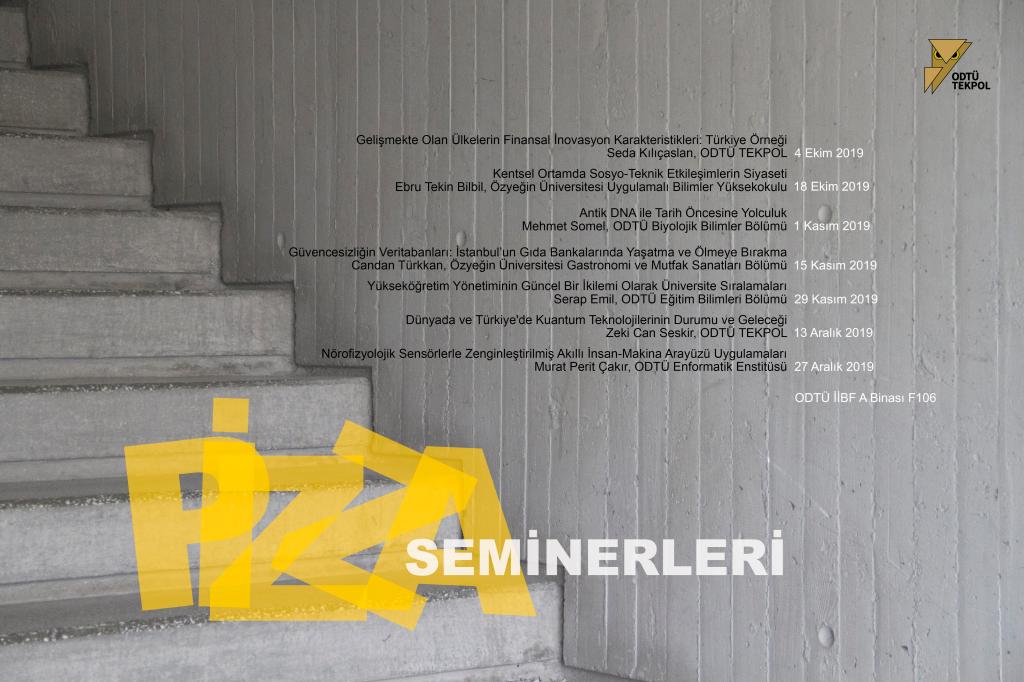
Talk
>>> I will be moderating the World Food Day Conference, 16 October 2019, Özyeğin University. To see full schedule :
16 Ekim 2019 Dünya Gıda Günü Konferansı – Türkiye’de Tarım , Gıda ve Değişen/Meyen Pratikler

Publication
>>> One of my Articles published in Yemek ve Kültür, food & culture quarterly from Turkey. (Protein sorunu ya da neden haz için gıdayı korumak istiyorum?)
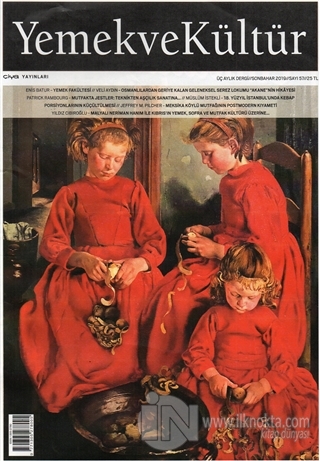
Conference
>>> I will be at 2nd International Symposium on Men and Masculinities / Masculinities: Challenges and Possibilities in Troubling Times . To see the full program:
2. Uluslararası Erkekler ve Erkeklikler Sempozyumu
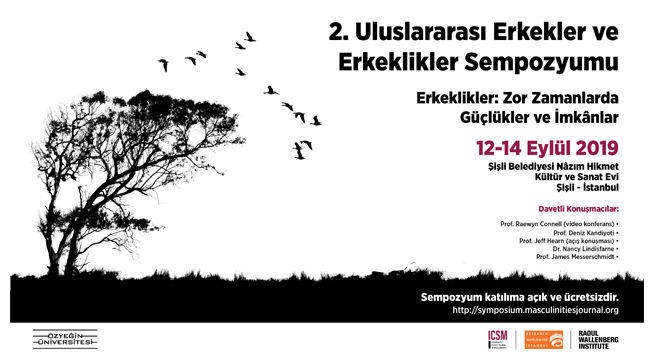
Talk
>>>I will be talking about the complexities and contradictions of Slow Food, aggrandizing of ‘traditional’, ‘slow’ cuisines and the latent exploitation of women’s reproductive labour in the domestic sphere as a part of Yerel ve Kırsal Kalkınma Uzmanlık Eğitimi Sertifika Programı at the Ozyegin University.
For the full program, see HERE.
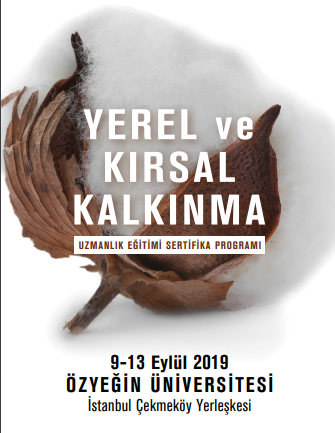
Talk
>>> I will be talking about “Food banks in İstanbul” in İstanbul Teknik Üniversitesi Ayazağa Kampüsü as a part of STS TURKEY 2019.

Talk
>>> I will be talking about “Sovereignty, Safety and Crysis of Food” in Ekofest 2019 Kazdağı. To see the full program:

Publication
>>> An old piece of mine from MetroGastro got republished with minor edits on Vedat Milor’s Mizanplas. Follow the link in the tweet below for the whole piece.
Enjoy!!
Publication
>>>SEV magazine talked to me for their summer 2019 issue.
Follow the link below the read the whole interview. We discussed food, food politics, sustainability and gastronomy.
“Gıda siyasi bir alandır”
SEV Connect – Yaz 2019
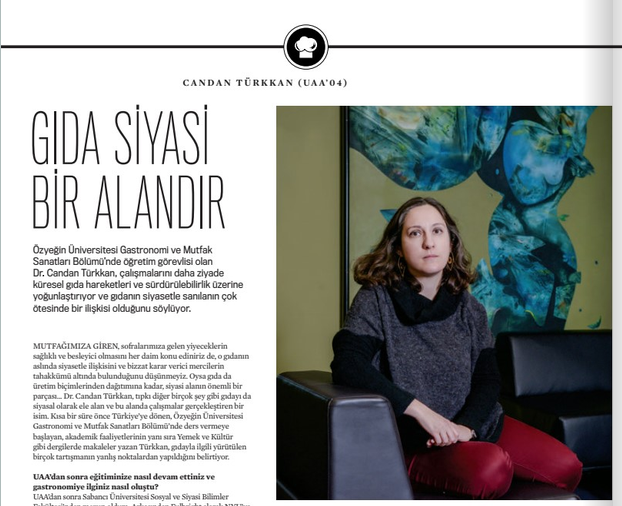
Conference
Association for the Study of Food and Society and the Agriculture, Food, and Human Values Society 2019 Conference
Theme: Finding Home in the “Wilderness”: Explorations in Belonging in Circumpolar Food Systems Explorations in Belonging in Circumpolar Food Systems
Location: Anchorage, Alaska, USA, June 26-29, 2019
Panel: Food, Hunger and Charity (Theme: The Food System: Access, Availability, and Utilization)
The Deserving Subjects: Subject-Formation in Istanbul’s Food Banks
Link: https://www.uaa.alaska.edu/academics/college-of-arts-and-sciences/programs/ASFS/schedule/ms1-food-hunger-and-charity.cshtml
Publication
>>>This time I wrote specifically for Mr. Milor’s Mizanplas:
To read it, here is the link
Publication
>>>One of my previously published essays is now featured in Vedat Milör’s Mizanplas.com. For those of you who want to read it, here is the link
Publication
>>> One of my Articles published in Yemek ve Kültür, food & culture quarterly from Turkey. (Gıda bankalarında toplum kurgusu)
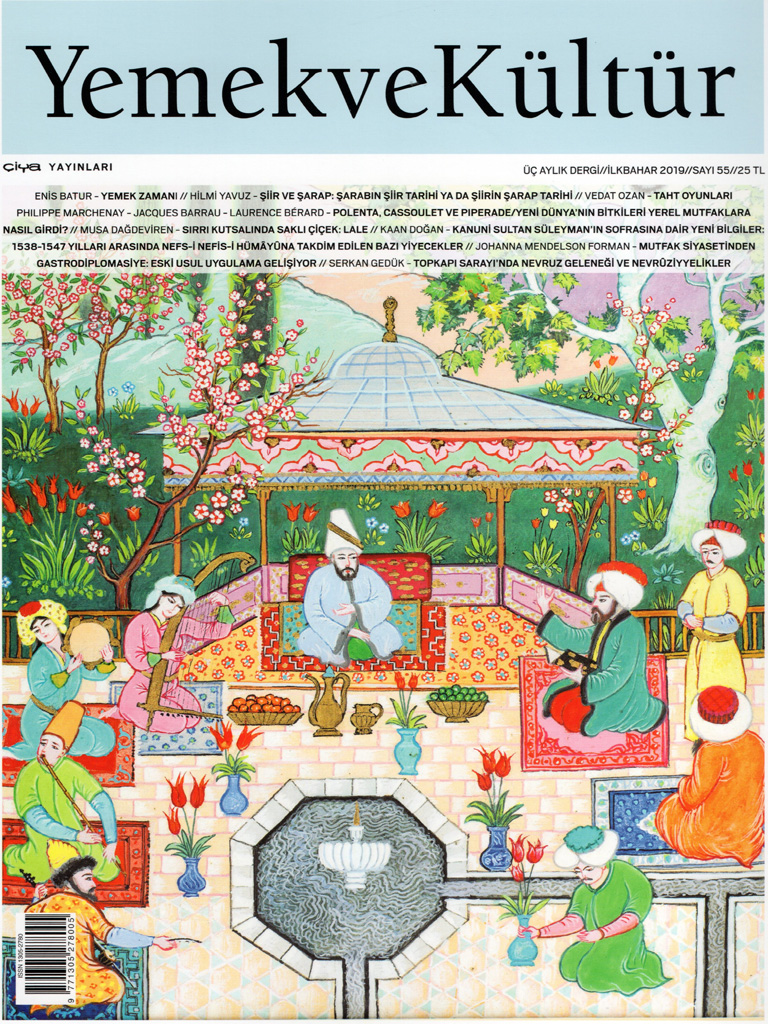
Publication
>>>I made to the cover of Yemek ve Kültür again, a food & culture quarterly from Turkey. (Dünyayı açlıktan kurtarmak için üç model)
Conference
>>>I was at the Sustainable Food Conference at Fairmont Quasar Istanbul.
Well-worth checking out!
Were you there? Have we met? Shoot me an email <candanturkkan@gmail.com> and lets get back in touch!
Publication
>>>I made to the cover of Yemek ve Kültür, food & culture quarterly from Turkey.
I am proud to be writing in such a respected journal with major names from the field. See my piece on the political economy of technological solutions to food scarcity and abundance problems at Yemek ve Kültür fall 2018 issue! (Eski dertler, yeni dermanlar ve teknolojik hayaller)
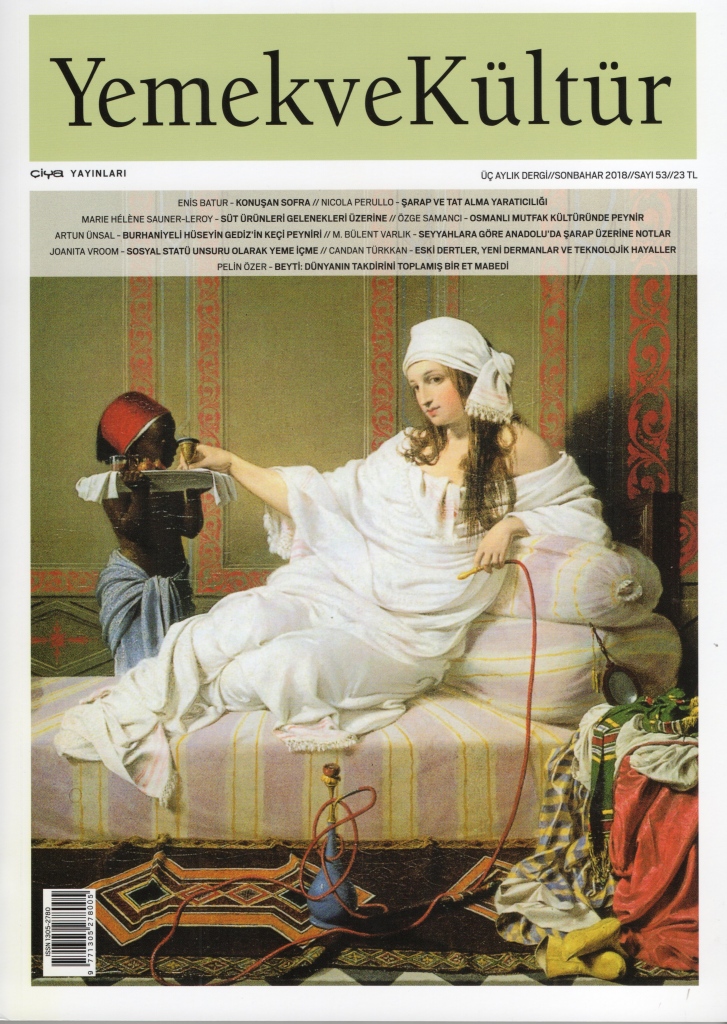
Publication
>>>One of my pieces published in Mr. Milor’s Mizanplas:
To read it, here is the link
Publication
>>>Recently Published:
Candan Turkkan (2018) Feeding the global city: urban transformation and urban food supply chain in 21st-century Istanbul, Journal of Urbanism: International Research on Placemaking and Urban Sustainability,DOI: 10.1080/17549175.2018.1515785
Conference
Western Political Science Association 2018 Annual Meeting
Section 16: Political Thought: Historical Approaches
Panel 16.05: Rights, Foundings, and the Limits of Sovereignty
Provisioning the City, Feeding the Body Politic: Limits of Classical Sovereignty
Friday, March 30, 2018, 8:00 – 9:45 AM
Talk
An Embodied Leviathan: Conceptualizing Sovereignty through the Provisioning of Ottoman Istanbul
Interdisciplinary Center for the Study of Global Change, University of Minnesota Twin Cities; Feb. 9, 2018, Minneapolis, MN, USA
Publication
>>> One of my Articles published in Yemek ve Kültür, food & culture quarterly from Turkey. (İntikam filmlerinden yemek tartışmaları)

Publication
>>> One of my Articles published in Yemek ve Kültür, food & culture quarterly from Turkey.(Et, ot ve sefertasında hayatlar…)
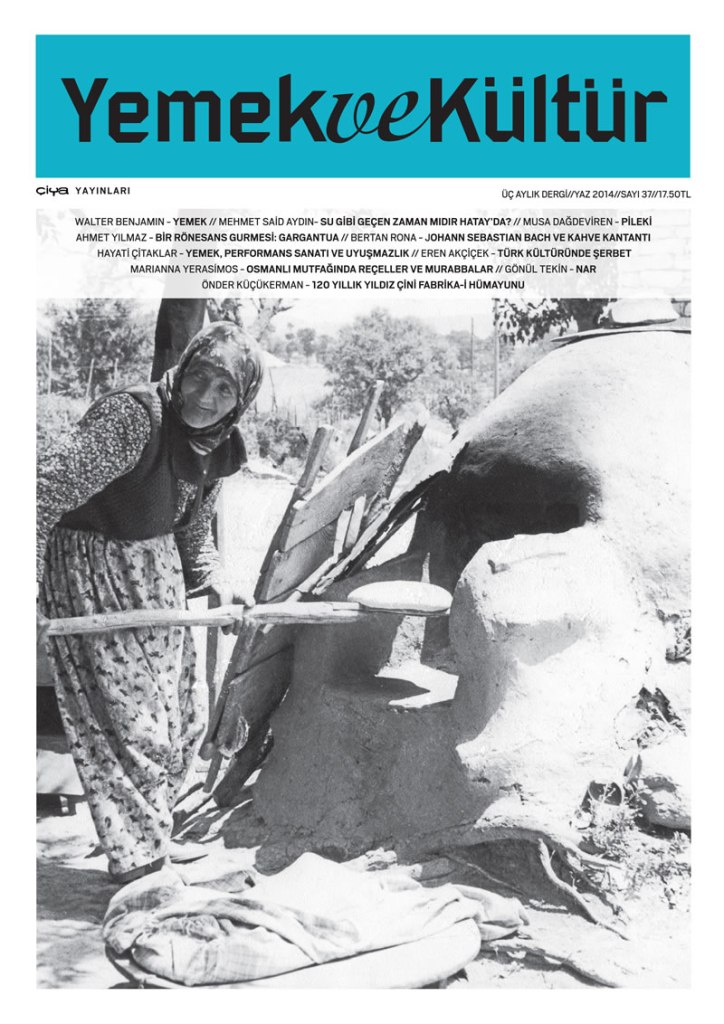
Publication
>>> One of my Articles published in Yemek ve Kültür, food & culture quarterly from Turkey. (İstanbul pazarlarında iş, aş ve toplumsal cinsiyet)

Publication
>>>My analzye about the movie “Spirited Away” by Hayoa Miyazaki, published in Yemek ve Kültür, food & culture quarterly from Turkey. My piece is offering perspectives to understand food depictions of the movie. ( Hayao Miyazaki’nin “Spirited Away” filmindeki yemek tasvirleri )

